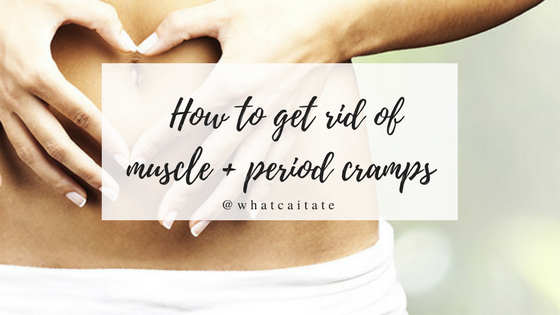
Essentially every woman deals with period cramps, and pretty much everyone has experienced a charley horse at least once in their lives. So how can you naturally get rid of these pesky + painful muscle and period cramps?? MAGNESIUM! I spoke about this topic on my Instagram story a few days ago, and had an immense response and plenty of questions about the topic. I decided it was best to write a blog post to cap all of the information so you can have the info at your fingertips whenever you need it. Lets get to it!
What Causes Cramps?
Magnesium is a cofactor for more than 300 enzymatic reactions in the human body, muscle contraction being one of them. Muscle cramps (yes, your uterus is a muscle!) are largely caused by an imbalance of electrolytes + minerals in the body, leading to improper neuromuscular transmission. In the most simple terms, our muscles need adequate amounts of magnesium to relax and calcium to contract. If we have too little magnesium or an imbalance between these two minerals, our muscles have a hard time relaxing and that is when we experience painful cramping.
How Do I Know If I’m Deficient?
Most americans today are deficient in magnesium for one reason or another: Our food is much lower in trace minerals now than ever before thanks to food processing, the soil in which our food is grown is much more mineral deficient than ever before- therefore making our veggies + other foods’ mineral deficient, high STRESS levels deplete our magnesium stores like nothing else, and HELLO! More than 300 enzymatic reactions that require magnesium?! Clearly, if we aren’t consuming enough magnesium on a daily basis- which most of us are not- we’re gonna have some issues- period + muscle cramps being one of them. Other signs of magnesium deficiency: insomnia, anxiety, muscle pain/fibromyalgia, high blood pressure, fatigue, migraines.
What Can I Do?
Instead of reaching for Midol or Tylenol when experiencing cramps, I suggest drinking 2 tsp of Natural Calm Magnesium mixed into 4-6oz of warm water. Within 5-10 minutes, you should notice a major reduction in the pain you are experiencing as the magnesium is absorbed into the body + utilized. No exaggeration, if I’m ever experiencing period cramps and I take this form of magnesium, my cramps are completely gone within 5 minutes!!! Also, as a preventative measure, you can take this supplement nightly to maintain optimal levels of magnesium in the body. The same amount (2 tsp in warm water) applies here.
Why This Supplement?
Natural Calm Magnesium is in Citrate form. This means the magnesium is mixed with citric acid, and therefore becomes extremely bioavailable: easily absorbed + assimilated into the body for immediate use. I have found with myself and with multiple clients that this product works best for immediate relief when experiencing cramps. I wouldn’t be suggesting this supplement if I didn’t try it myself and trust in its efficacy and ingredients 100%.
I’ve seen this issue (muscle pain, cramps, and period cramps) time and time again with clients, and magnesium always does the trick. There is plenty of science to back up these claims, and if you are hungry for more information in regards to magnesiums’ overall function in the body, I suggest checking out This Article!
If you want to know the specific amounts of magnesium in your own body, I suggest speaking with your doctor to get a blood test OR speaking with a holistic practitioner to complete a Hair Tissue Mineral Analysis.


+ show Comments
- Hide Comments
add a comment